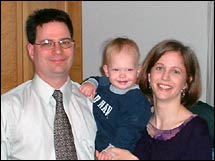NEW YORK (CNN/Money) - Heather Randol loves to explore the intricacies of personal finance and discover new ways to save and invest.
"I've always been interested in being financially secure," she says.

That's a good thing, because the finances of Heather and her husband, Scott, have been tested. In the 10 years they've known each other (they were married in May 1998), he has spent five in grad school. What's more, the couple is raising Raymond, their two-year-old son.
She earns about $65,000 a year as an environmental health and safety specialist at the University of California at Berkeley. Scott adds about $10,000 to that by acting as a museum and science-center consultant, when he's not busy earning his Ph.D in science education at Berkeley (he has two years to go).
That has proven sufficient to maintain what they regard as a comfortable, though not luxurious, lifestyle.
"We try to live below our means," says Heather. "People think we're making great sacrifices, but we find it very liberating."
| More Millionaire Profiles
|

|
|
|
|
They've made it almost a kind of game to limit their income by living on Heather's salary alone, even when Scott has been employed full time. At the same time, they build for the future. They've routinely maxed out their contributions to tax-free retirement accounts whenever possible. And they bought a house, rather than rent.
Finding the benefits
Where Heather really shines is in ferreting out the less obvious savings strategies. "The information is out there," she says. "You just have to find it. I'm the kind of person who, when I get a new job, reads the benefit package from cover to cover."
One item she found in the Berkeley offering is the dependent care reimbursement account. This is an IRS-approved flexible benefit account that permits employees to have employers deduct a set amount from every paycheck and then reimburse it for child-care costs.
Right now, Scott watches two-year-old Raymond two days of the workweek and the toddler is in day care the other three, which costs $600 a month. Berkeley takes that amount from Heather's pre-tax paycheck, and the reimbursement is not counted as income. Heather figures it saves nearly $200 a month in taxes.
The couple also has a health-care reimbursement account, but since their health bills are low, the annual tax benefit only amounts to a couple hundred dollars.
Another Berkeley benefit Heather exploits is its transportation subsidy, which lowers her cost of commuting on the Bay Area Rapid Transit (BART) system to about $28 a month. A parking pass at the University costs more than twice that.
Exploiting falling interest rates
Three years ago, the Randols, who are in their early thirties, picked out a house in the nearby industrial city of Richmond, Calif., "not the most desirable place to live," says Heather.
"Having a family in the East Bay, it was very important financially to buy a house that we could afford," she says. In tonier suburbs, such as neighboring El Cerito, comparable homes commanded prices $50,000-to-$100,000 more than the $197,000 they paid for their small three-bed, two-bath house.
For the down payment, they used money banked from Scott's job at a science center in Orange County, where he worked from February 1998 through May of 2000, before he was accepted into his doctorate program. Since the purchase the couple has twice taken advantage of falling mortgage rates to refinance and lower their monthly costs.
With an 8.25 percent rate, their monthly payment came to about $1,800, including taxes and mortgage insurance. They refinanced in June 2002 at 6.25 percent, and with the rise in real estate prices, their home equity now exceeded 20 percent of the principle, so they were able to eliminate the private mortgage insurance. Their monthly nut fell to $1,450.
This past June they refinanced again, opting for a 30-year, due-in-seven mortgage with an interest rate of 4.25 percent, which reduced their payment to $1,275.
Prepared for the future
All the couple's strategies have contributed to more than $100,000 in savings, checking, IRAs, 403(b) accounts, and stocks. Their home equity puts total assets above the $200,000 mark. Scott usually receives grants to pay his tuition, so their only debt is about $5,500 in student loans, which are on hold, interest-free, until he finishes his Ph.D.
Then he hopes to land a job developing educational programs for a museum or science center, an interest that carries over to the couple's spare time, in which their preferred recreations are to visit museums, aquariums, and other educational facilities. They also like the beach and the mountains, and since Ray's birth, spend much of their vacation time with their families in the Seattle area.
The couple's "joy-to-stuff ratio" is high, Heather claims. "We don't have a cell phone, or a DVD player. I drive a 1991 Corolla with 140,000 miles on it." Their motto is, "If you don't have it you can't miss it."
Financial independence is more than worth the small annoyances necessitated by the personal financial choices they make. "Scott and I knew we wanted to have flexibility," says Heather. "We never wanted to feel stuck."

|

